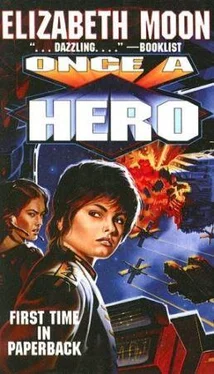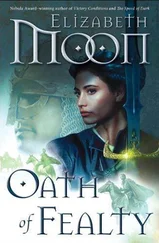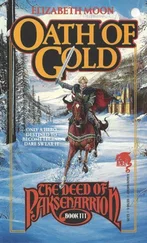Elizabeth Moon - Once a Hero
Здесь есть возможность читать онлайн «Elizabeth Moon - Once a Hero» весь текст электронной книги совершенно бесплатно (целиком полную версию без сокращений). В некоторых случаях можно слушать аудио, скачать через торрент в формате fb2 и присутствует краткое содержание. Жанр: Космическая фантастика, Боевая фантастика, на английском языке. Описание произведения, (предисловие) а так же отзывы посетителей доступны на портале библиотеки ЛибКат.
- Название:Once a Hero
- Автор:
- Жанр:
- Год:неизвестен
- ISBN:нет данных
- Рейтинг книги:3 / 5. Голосов: 1
-
Избранное:Добавить в избранное
- Отзывы:
-
Ваша оценка:
- 60
- 1
- 2
- 3
- 4
- 5
Once a Hero: краткое содержание, описание и аннотация
Предлагаем к чтению аннотацию, описание, краткое содержание или предисловие (зависит от того, что написал сам автор книги «Once a Hero»). Если вы не нашли необходимую информацию о книге — напишите в комментариях, мы постараемся отыскать её.
Once a Hero — читать онлайн бесплатно полную книгу (весь текст) целиком
Ниже представлен текст книги, разбитый по страницам. Система сохранения места последней прочитанной страницы, позволяет с удобством читать онлайн бесплатно книгу «Once a Hero», без необходимости каждый раз заново искать на чём Вы остановились. Поставьте закладку, и сможете в любой момент перейти на страницу, на которой закончили чтение.
Интервал:
Закладка:
“Is that possible—I mean, you said it would take—”
“Longer than we have. I know. Hull repairs alone should run sixty to seventy days . . . then there’s refitting the internal systems, installing the weapons, testing. But there’s nothing else to do. Maybe they’ll be late—maybe they’ll get lost. Maybe our fleet will come back. Or maybe they’ll get the self-destruct fixed and we won’t have to worry about anything . . . at least those of us who don’t believe in an afterlife. Do you? Is that why you think it’s a good idea?”
“Not . . . exactly.” She didn’t believe in the afterlife her great-grandmother had taught her about, where the dead were placed on the level they’d earned like pots of flowers on a stand. But she found it hard to imagine nothingness, an absolute end.
“Mmm.” Pitak looked as if she’d like to say something more, but someone called her from the passage and she left without another word. Esmay looked at her screen a moment, and then at the bulkhead. Barin a hostage . . . Barin dead? She could not imagine either of those . . . not Barin, so brimful of energy, so much a Serrano. It was not her assignment. Pitak had warned her. But . . . of all the people on this ship, she was the one who had actually fought on shipboard.
There must be others. Security personnel had experience; that’s what they trained for. She wasn’t trained. She had no weapons.
She was thinking the wrong things. She wasn’t thinking at all. Memory splashed her mind with the images of battle in Despite . . . she could imagine that behind the partition between her cubicle and the rest of the offices, someone lurked with a weapon.
Ridiculous. Yet she could not just sit there; she itched to be . . . somewhere, doing . . . something. She scolded herself for letting a brief experience of command turn her head. With a shipful of admirals on down, they weren’t going to let a lieutenant in Hull and Architecture do anything but look up statistics in computer files.
Barin had dozed off, but woke when he heard an approaching noise. Help, maybe? Instead it was another of the intruders, with two men and a woman in civilian clothes. Barin knew, in a general way, who they were: civilian technical advisors, experts, contractors hired to do something in weapons systems. He’d never actually met any of them, though he’d seen them in the corridors and lift tubes occasionally. Ordinary middle-aged civilians, he’d thought. Of no interest to him, since they weren’t working in his area. Now they stared at him as if he were a monster too. He supposed he looked pretty bad, with his swollen nose and bruised face, but they didn’t have to look as if they thought it was all his fault.
“You lied to us,” one of the Bloodhorde said. “You were paid to fix this, and you didn’t. When we looked, the lights were green.”
“But we did fix it,” said the taller man earnestly. “We fixed it so that it wouldn’t work, but the captain would think it did work. That’s why all the telltales are green. He could run his system test, and it would come up—”
“They’re not green now,” his captor said.
“What happened?” The man leaned past his captor to look, and turned an interesting shade of pale green. “You—did you tear those wires out?”
“To make sure it wouldn’t work, yes. Because you lied to us.”
“But I didn’t lie. Now he knows it doesn’t work—and he could have a backup—”
“You were supposed to disable all self-destruct devices.” That with a series of shoves that ended when the man bumped into the bulkhead. “You were paid to do that!” Another, harder shove; the man staggered. “So if you left one, then you have broken your word to us, and . . . we take that very seriously.”
“But—we don’t know—we did what you said—” The man looked as if he couldn’t quite believe the situation; he kept glancing at Barin and away again.
“Fix it again so that it looks to the captain as if it’s working,” the Bloodhorde leader said.
“But the captain will know it’s been tampered with—fixing it now won’t convince him. Someone would have to tell him . . . I could go tell him I could fix it, they know we’re experts in weapons systems, and then I could—” The man didn’t have time to flinch away before he was dying, the blade deep in his throat and a hard hand squeezing his mouth, stifling his last bubbling scream. Blood spurted, then flowed, then stopped, filling the compartment with the smell of blood so strong it almost covered the stench of death itself.
The woman screamed, a short cry cut off in terror as one of the others slapped her. The killer let the dead man fall, and then wiped his bloody hand across his own mouth, then the woman’s. “They don’t call us the Bloodhorde for nothing,” he said, grinning. With the same knife—and it seemed even worse to Barin that he didn’t wipe it clean between the killing and the mutilation—he sliced off the dead man’s left ear, bit it hard once, and then tucked it away in his uniform. “Now,” he said to the second civilian. “You will fix this so it looks as if it’s working.”
The second man, shorter and darker-haired than the other, hurried to comply. When he had done, the telltales showed green again.
“That’s got it,” he said.
“Is this right?” the killer asked the woman.
“Yes . . . yes it is right,” she said.
“If you know that, we don’t need him,” the killer said, and caught the smaller man by the collar, half-choking him. “We’d rather . . . work . . . with you.”
“No!” The woman lunged, but one of the others caught her. She tried to fight free, but she had no skill, and no strength to make up its lack. “No, let him—please—”
The killer laughed. “We heard what you said about the Bloodhorde . . . how you taunted our agent.”
She turned even whiter.
“You dared to bind him . . .” He twisted the man’s collar until the man’s face purpled. “You threatened. You had a noose around his neck . . . and now you have a noose around your neck. Even barbarians, as you call us, understand poetic justice.”
Barin could not look away; there was a fascination in this that disgusted him with himself. The killer twisted . . . twisted . . . and horribly, slowly, the dapper little man about whom Barin knew nothing died, his struggles weaker and weaker until they ceased.
“We pay our debts,” the killer said to the woman. “All of them, the ones you know about and the ones you don’t. Do we think size is everything? I believe that was your complaint, was it not? Then I believe you should have a chance to experience size in a way suitable to you in particular.”
The woman gave Barin a frantic glance, and the killer laughed. “You think he could help you? This boy with a broken nose, that we captured as easily as we took you?”
He had to do something. He couldn’t just lie here doing nothing . . . but no matter how he struggled, he couldn’t loosen the very efficient bindings they’d taken from ship security. Through all that followed, he struggled, rasping his wrists raw, earning a random cuff now and then from men more amused than concerned with his efforts. The woman struggled too, but it did her no good; one after another they took her, in ways that Barin’s inexperience had not imagined. Finally her struggles, her gasps and moans, died away, and she lay still. He couldn’t tell if she was dead, or just unconscious. She had been some kind of traitor apparently . . . he had gotten that much from what they’d all said . . . but no one deserved what had happened to her.
One of the men spoke to the other in their language, something Barin could tell was meant as a joke. The one on her pushed himself up, laughing, and then turned to Barin. He grinned even wider.
Читать дальшеИнтервал:
Закладка:
Похожие книги на «Once a Hero»
Представляем Вашему вниманию похожие книги на «Once a Hero» списком для выбора. Мы отобрали схожую по названию и смыслу литературу в надежде предоставить читателям больше вариантов отыскать новые, интересные, ещё непрочитанные произведения.
Обсуждение, отзывы о книге «Once a Hero» и просто собственные мнения читателей. Оставьте ваши комментарии, напишите, что Вы думаете о произведении, его смысле или главных героях. Укажите что конкретно понравилось, а что нет, и почему Вы так считаете.












